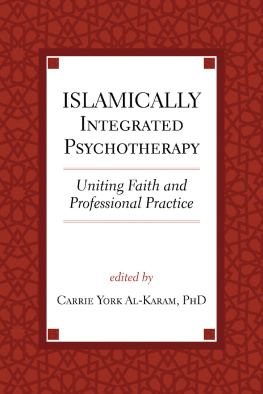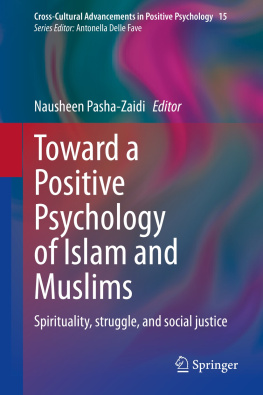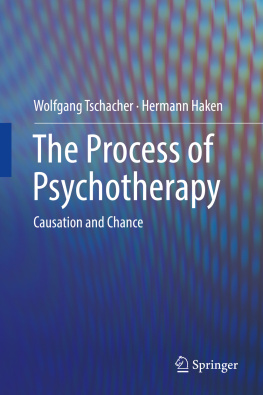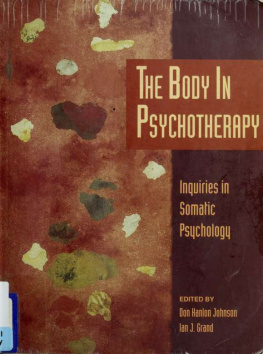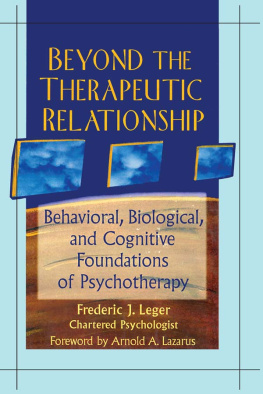
Templeton Press
300 Conshohocken State Road, Suite 500
West Conshohocken, PA 19428
www.templetonpress.org
2018 by Carrie York Al-Karam
All rights reserved. This book may not be reproduced, in whole or in part, including illustrations, in any form (beyond that copying permitted by Sections 107 and 108 of the U.S. Copyright Law and except by reviewers for the public press), without written permission from the publishers.
Set in Adobe Jenson pro by Gopa & Ted2, Inc.
Library of Congress Control Number: 2018943026
ISBN: 978-1-59947-541-7 (cloth: alk. paper)
eISBN: 978-1-59947-5424
This paper meets the requirements of ANSI/NISO Z39.48-1992
(Permanence of Paper).
A catalogue record for this book is available
from the Library of Congress.
18 19 20 21 22 10 9 8 7 6 5 4 3 2 1
Printed in the United States of America.

Advance Praise for Islamically Integrated Psychotherapy
Al-Karam has assembled a diverse and talented team to demonstrate how psychology (and psychotherapy in particular) can be approached from a Muslim worldview. This remarkable and nuanced work will serve the field by spurring discussion, promoting understanding, and hopefully igniting research in the area. I heartily encourage it as a starting point for all who want to understand and work effectively with Muslims in therapy.
TIM SISEMORE, PHD, president of APAs Society for the Psychology of Religion and Spirituality (Div. 36) and author of The Psychology of Religion and Spirituality: From the Inside Out (Wiley)
This edited volume makes a profound contribution to the existing literature on psychotherapy broadly, and amplifies the voices of Muslim practitioners. Among the most salient features are the diverse treatment modalities featured, the weaving of conceptual and practical content, and the range of audiences that can benefit from the book!
ALTAF HUSAIN, MSSA, PHD, associate professor, Howard University School of Social Work and vice president, Yaqeen Institute for Islamic Research
The book is a testimony to the profound multifaceted contributions of a new generation of Muslim psychologists. Just by reading the titles of the chapters and the names of the authors, any psychologist practicing in the Muslim world would find it necessary to have it as a reference for helping him or her with the unique problems of Muslim clients.
MALIK BADRI, professor of Psychology, Istanbul Zaim University
This is a timely book to guide practitioners worldwide in developing and using Islamic paradigms and principles in their work. The need to share their insights is paramount in taking this field further to the Muslim community and to the mainstream globally.
NASIMA KHANOM, Consultant Specialist Systemic/Family Psychotherapist and founding chair of the Islamic Psychology Professional Association (IPPA)
A timely, bold and much-needed work offering insights into working with Muslim clients all over the world.
AMBER HAQUE, PHD, professor of Clinical Psychology, United Arab Emirates University
This book is a landmark in the epiphany of Islamic Psychology in the West: a must read for all those with an interest in the field.
RASJID SKINNER, consultant clinical psychologist and visiting professor of Clinical Psychology at the University of Karachi
Carrie York Al-Karam has edited a must-read primer for any counselor or therapist working with Muslim patients and couples. After reading this book, you will have learned from some of the best researchers in the field.
RUKHSANA M. CHAUDHRY PSYD, director of Mental Health Programming, American Muslim Health Professionals
This is a remarkable and skillfully written book. All the chapters give us the opportunity to explore and better understand psychology through the Islamic lens. I applaud this initiative, and highly recommend this book to be a source of reference for all in the field of psychology.
JOANNE HANDS, PHD, LPC, LMFT, president, Middle East Psychological Association
How truly fortunate we are to have this fascinating overview and useful introduction to the important field of global Islamic psychotherapy.
VIRGINIA GRAY HENRY, director of Fons Vitae and codirector of the Ghazali Childrens Project
This book is a most welcome and vital addition to the re-emerging and rapidly growing field of Islamic Psychology and Psychotherapy. It is an essential read for all Muslim counsellors, psychotherapists, psychologists and psychiatrists from all modalities, and contains valuable insights for any clinician working with Muslim clients.
MYIRA KHAN, founder of the Muslim Counsellor and Psychotherapist Network (MCAPN), BACP accredited counsellor and supervisor, BACP Board of Governors Trustee

Bismillah al-Rahman al-Raheem
In the name of God, the most Gracious, the most Merciful
CHAPTER 1
An Islamic Theoretical Orientation to Psychotherapy
Abdallah Rothman, LPC
M UCH OF WHAT has been written on and explored with regards to the intersection of Islam and psychology tends to examine the Muslim experience and how psychotherapy can cater to this population. It has been more of a response to the increasing call for multicultural capacity building than it has been an exploration of psychology from the perspective of an Islamic worldview. This focus tends to result in studies of best practice in working with Muslim clients, which can be problematic given that the worlds population of Muslims consists of hundreds of different cultures (Kettani, 2010). Yet the desire for the field of psychology to understand how to work with Muslims and the palatable need for mental health services among many populations of Muslim people have given rise to a growing field of Muslim Mental Health. It may be that the most effective way to find common ground among this diverse population is to focus more on the Islamic orientation of these people rather than their relative identity as Muslims. However, there remains a dearth of collective understanding on how an Islamic worldview can be practically and effectively integrated into psychotherapy as well as a lack of understanding of how an Islamic orientation to psychology might also have something to offer to a broader range of people beyond those who identify as Muslim.
I am Muslim and I am a psychotherapist, but I do not consider what I do to be Muslim Mental Health primarily. While many of my clients are Muslim and I work with them on issues of mental health, this label does not accurately describe the focus of my work. My approach to psychology and mental health is based in the Islamic tradition, and Muslims thus tend to identify with it because it is a familiar framework to them. However, when I work with non-Muslim clients I do not change my fundamental orientation, nor do I shift the focus of the actual treatment goals. My goal is to help human beings attune to what works for optimizing their human experience.
I like to make a distinction between Muslim psychology and Islamic psychology. Muslim psychology focuses on how Muslims think and behave. It is primarily a culturally adapted approach to Western therapy that incorporates language, customs, and culturally relevant sentiments into the therapeutic process. This can be useful for many reasons, as it allows for psychotherapy to be more relevant to Muslim populations and to perhaps make such services palatable where they may otherwise be stigmatized as Western, secular, un-Islamic, or simply not culturally relevant. A great number of practitioners are Muslim and have studied psychology and therefore may be equipped to approach their work from within their cultural or religious viewpoint for the benefit of their Muslim clients. Far fewer practitioners have an understanding of how to approach psychotherapy from within an Islamic paradigm of psychology. Thus, this is the distinction between a Muslim psychologist and a Muslim who practices Islamic psychology.
Next page
